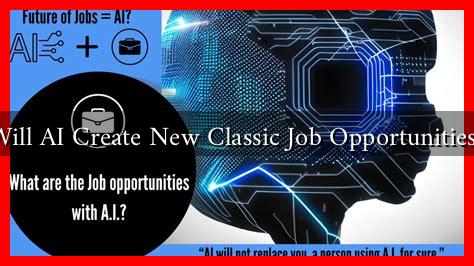-
Table of Contents
Will AI Create New Classic Job Opportunities?
The rapid advancement of artificial intelligence (AI) has sparked a significant debate about its impact on the job market. While many fear that AI will lead to widespread job displacement, others argue that it will create new opportunities that could redefine the workforce. This article explores the potential for AI to generate classic job opportunities, examining the sectors likely to benefit and the skills that will be in demand.
The Dual Nature of AI: Displacement vs. Creation
AI’s influence on employment is often viewed through a dual lens: the potential for job displacement and the promise of job creation. According to a report by the World Economic Forum, it is estimated that by 2025, AI could displace 85 million jobs globally, but it could also create 97 million new roles. This net gain suggests that while some jobs may become obsolete, new ones will emerge, often requiring different skill sets.
Industries Poised for Growth
Several industries are expected to experience significant growth due to AI integration. Here are some key sectors where new job opportunities are likely to arise:
- Healthcare: AI is revolutionizing patient care through predictive analytics, personalized medicine, and robotic surgery. Roles such as AI healthcare specialists and telemedicine coordinators are emerging.
- Technology: As AI technologies evolve, there will be a growing demand for AI ethicists, data scientists, and machine learning engineers to develop and manage these systems.
- Finance: AI is transforming financial services with algorithmic trading, fraud detection, and customer service automation. New roles in AI risk management and financial data analysis are on the rise.
- Manufacturing: The integration of AI in manufacturing processes is leading to the creation of jobs in robotics maintenance, AI system management, and smart factory operations.
- Education: AI-driven personalized learning platforms are creating opportunities for educational technologists and curriculum developers who can integrate AI into teaching methodologies.
Skills for the Future Workforce
As AI continues to reshape the job landscape, certain skills will become increasingly valuable. Workers will need to adapt to these changes by acquiring new competencies. Key skills include:
- Data Literacy: Understanding data analysis and interpretation will be crucial as organizations rely on data-driven decision-making.
- Technical Proficiency: Familiarity with AI tools and technologies, including programming languages like Python and R, will be essential for many new roles.
- Soft Skills: Skills such as critical thinking, creativity, and emotional intelligence will be vital as AI takes over routine tasks, allowing humans to focus on complex problem-solving.
- Adaptability: The ability to learn and adapt to new technologies will be a key asset in a rapidly changing job market.
Case Studies: Companies Leading the Way
Several companies are already paving the way for new job opportunities through AI integration. For instance:
- IBM: IBM’s Watson has created roles in AI consulting and data analysis, helping businesses leverage AI for better decision-making.
- Amazon: Amazon has invested heavily in AI for logistics and customer service, leading to new positions in AI system management and robotics.
- Google: Google’s AI initiatives have led to the creation of roles in AI ethics and policy, ensuring responsible AI development.
Conclusion: Embracing the Future of Work
While the rise of AI presents challenges, it also offers a unique opportunity to create new classic job roles that can enhance productivity and innovation. By focusing on education and skill development, workers can prepare for the future job market, which will likely be characterized by collaboration between humans and machines. As industries evolve, embracing AI as a tool for growth rather than a threat will be crucial for both individuals and organizations.
In summary, AI is not just a disruptor; it is also a catalyst for new job opportunities across various sectors. By understanding the skills needed and the industries poised for growth, workers can position themselves to thrive in an AI-enhanced workforce. For more insights on the future of work and AI, visit World Economic Forum.

